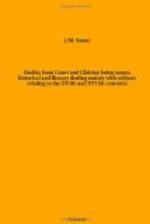Bedingfeld proclaimed the queen at Norwich, and was afterwards rewarded for his loyalty with an annual pension of 100 pounds out of the forfeited estates of Sir Thomas Wyatt. Mary made him a Privy Councillor and Knight Marshal of her army, and subsequently Lieutenant of the Tower of London; and Captain of the Yeomen of the Guard, vice Sir Henry Jerningham. She appointed him custodian of Elizabeth, when that princess was confined in the Tower and at Woodstock, on suspicion of being concerned in Wyatt’s rebellion; and so little did Elizabeth resent his severity during the time of her imprisonment, that after her accession, she addressed him as her “trusty and well-beloved,” employed him in her service, and granted to him the manor of Caldecot in Norfolk, which still forms part of the Oxburgh estate at the present day.
He was undoubtedly one of the foremost Englishmen of his day, respected by two sovereigns, and occupying prominent and honourable positions, his loyalty being unimpeachable; yet Foxe, the martyrologist, with his wonted dishonesty, has without the slightest foundation, and so effectually, blackened his fame, that almost every subsequent writer on this period has reproduced the calumnies set forth with malice prepense in the Acts and Monuments.
Strype was the first unquestioning copyist of Foxe; Burnet was the second; and Sir Reginald Hennell is the most recent.*
* In his volume “The History of the King’s Bodyguard of the Yeomen of the Guard.”
Tennyson, in his dramatic poem Queen Mary, also went to Foxe for his historical data, with the result that, while discarding the more malicious interpretation of Bedingfeld’s character, he has, nevertheless, passed on to posterity a coarse and grotesque caricature as though it were a portrait.
A fire broke out at Woodstock in May 1554, and Tennyson choosing to suppose that Elizabeth suspected foul play, invented the following absurd dialogue:—
Lady.
I woke Sir Henry—and he’s true to
you-
I read his honest horror in his eyes.
Elizabeth.
Or true to you?
Lady.
Sir Henry Bedingfeld!
I will have no man true to me, your Grace,
But one that pares his nails; to me? the clown!
For like his cloak, his manners want the nap
And gloss of court; but of this fire he says,
Nay swears, it was no wicked wilfulness,
Only a natural chance.
Elizabeth.
A chance-perchance
One of those wicked wilfuls that men make,
Nor shame to call it nature.
At the end of a long speech Elizabeth cries
God save the Queen. My jailor—
Bedingfeld.
One, whose bolts,
That jail you from free life, bar you from death.
There haunt some Papist ruffians hereabout
Would murder you.
Elizabeth.
I thank you heartily, sir,
But I am royal, tho’ your prisoner,
And God hath blest or cursed me with a nose—
Your boots are from the horses.




